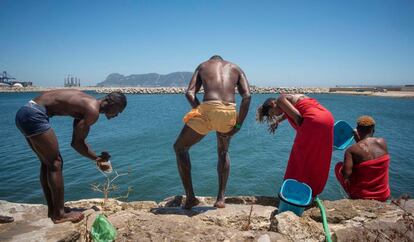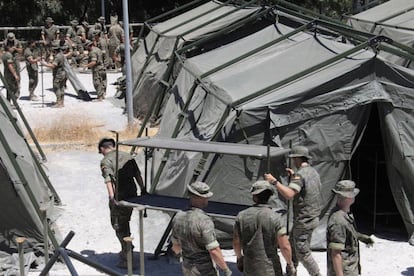Spain asks EU for emergency funding to help with migrant arrivals
The extra money will be used to shelter the growing number of people arriving on Spanish shores

Spain is asking the European Union for help to manage growing migration flows in the Mediterranean. The Spanish government has requested additional emergency aid from the European Commission, said a spokesperson for this EU institution on Monday.
Besides listing its own demands, the Spanish government has added a list of requests from Morocco
Commission sources suggested there will be a positive response to the request, without providing details of the aid that might be extended. Spain is asking for money from the Asylum, Migration and Integration Fund, which has set aside €3.1 billion for the 2014-2020 period for assistance to migrants and refugees.
Spain last received funds on July 2, when the EU sent €25.6 million to improve the migrant reception system in Ceuta and Melilla, two Spanish cities located on the northern coast of Africa that have recently seen a spike in arrivals from Morocco. The funds were also aimed at enhancing return strategies.
Moroccan requests
Besides listing its own demands, the Spanish government has added a list of requests from Morocco, a traditional ally in stemming migration flows into Europe. Sources at La Moncloa, the seat of Spanish government, admitted that for the last two years Rabat has been expecting greater financial support from the EU budget, which they estimated at around €30 million. Other sources raised that figure to €190 million.

But the EU executive has suggested that part of that request has already been addressed through a recent release of €55 million for border management in Morocco and Tunisia. Internal EU reports have warned that Morocco is easing security at the border. Experts say Moroccan border authorities are failing to stop criminal organizations from smuggling migrants to Spain. “Internal issues in Morocco, the main transit country to Spain, have caused a gap which allows more exits, particularly from the west coast of Morocco,” warns a 2018 risk analysis report.
Saturated centers
Authorities in Andalusia are struggling to find the resources to assist all the undocumented migrants who have reached the region’s southern shores in recent months. Over 1,800 people who were recently rescued in the Strait of Gibraltar are temporarily housed in pavilions and sports centers in Cádiz province.
According to the Interior Ministry, 17,605 undocumented migrants have arrived in Spain by sea since the beginning of the year, and 3,292 more have entered by land through Ceuta and Melilla. An average of 54 people arrived in Spain by sea each day in the first five months of 2018. That average has since shot up to 220 per day.
Spain has now become the main gateway into Europe through the Mediterranean, ahead of Italy and Greece. Shelter services have been unable to keep up with the demand, leaving many migrants to sleep in overcrowded centers, police stations and even boat decks.
Border reinforcements
The Spanish Interior Ministry has sent a new contingent of around 20 border patrol officers to Ceuta, said the government in a release on Monday. Five vehicles and a helicopter with night vision imaging technology have also been dispatched to the area.
The move comes after around 800 immigrants stormed the border fence last Thursday, using quicklime and other weapons against officers. Following the incident, the government delegate in the Spanish enclave, Salvadora Mateo, informed Interior Minister Fernando Grande-Marlaska about the urgent need to increase the presence of law enforcement officers at the border.
Representatives for Civil Guard officers were not impressed by Grande-Marlaska’s recent visit to Algeciras to supervise the rescue and assistance of migrants arriving on the shores of Cádiz province. “A simple pat on the back will not do,” said Raúl Lobato, spokesman for the Spanish Association of Civil Guards (AEGC).
Lobato said that officers working at the border with Morocco “are at their limit, because the situation there has been very complicated for a very long time.” He said there are “very well-organized mafias operating in the area, and the problem must be addressed on site, by controlling those mafias.” This, he said, requires “more personnel and more resources.”
English version by Susana Urra.
Tu suscripción se está usando en otro dispositivo
¿Quieres añadir otro usuario a tu suscripción?
Si continúas leyendo en este dispositivo, no se podrá leer en el otro.
FlechaTu suscripción se está usando en otro dispositivo y solo puedes acceder a EL PAÍS desde un dispositivo a la vez.
Si quieres compartir tu cuenta, cambia tu suscripción a la modalidad Premium, así podrás añadir otro usuario. Cada uno accederá con su propia cuenta de email, lo que os permitirá personalizar vuestra experiencia en EL PAÍS.
¿Tienes una suscripción de empresa? Accede aquí para contratar más cuentas.
En el caso de no saber quién está usando tu cuenta, te recomendamos cambiar tu contraseña aquí.
Si decides continuar compartiendo tu cuenta, este mensaje se mostrará en tu dispositivo y en el de la otra persona que está usando tu cuenta de forma indefinida, afectando a tu experiencia de lectura. Puedes consultar aquí los términos y condiciones de la suscripción digital.









































